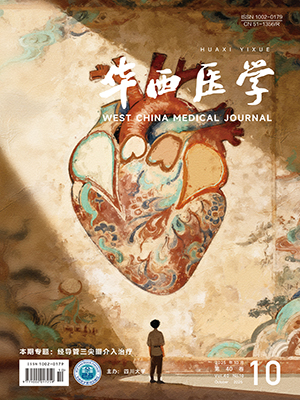| 1. |
Griffiths CEM, Armstrong AW, Gudjonsson JE, et al. Psoriasis. Lancet, 2021, 397(10281): 1301-1315.
|
| 2. |
Langley RG, Krueger GG, Griffiths CE. Psoriasis: epidemiology, clinical features, and quality of life. Ann Rheum Dis, 2005, 64(Suppl 2): ii18-ii25.
|
| 3. |
Parisi R, Symmons DP, Griffiths CE, et al. Global epidemiology of psoriasis: a systematic review of incidence and prevalence. J Invest Dermatol, 2013, 133(2): 377-385.
|
| 4. |
Elmets CA, Leonardi CL, Davis DMR, et al. Joint AAD-NPF guidelines of care for the management and treatment of psoriasis with awareness and attention to comorbidities. J Am Acad Dermatol, 2019, 80(4): 1073-1113.
|
| 5. |
Honda K, Littman DR. The microbiota in adaptive immune homeostasis and disease. Nature, 2016, 535(7610): 75-84.
|
| 6. |
de Alcantara CC, Reiche EMV, Simão ANC. Cytokines in psoriasis. Adv Clin Chem, 2021, 100: 171-204.
|
| 7. |
Thye AY, Bah YR, Law JW, et al. Gut-skin axis: unravelling the connection between the gut microbiome and psoriasis. Biomedicines, 2022, 10(5): 1037.
|
| 8. |
Buhaș MC, Gavrilaș LI, Candrea R, et al. Gut microbiota in psoriasis. Nutrients, 2022, 14(14): 2970.
|
| 9. |
Hidalgo-Cantabrana C, Gómez J, Delgado S, et al. Gut microbiota dysbiosis in a cohort of patients with psoriasis. Br J Dermatol, 2019, 181(6): 1287-1295.
|
| 10. |
Zhang X, Shi L, Sun T, et al. Dysbiosis of gut microbiota and its correlation with dysregulation of cytokines in psoriasis patients. BMC Microbiol, 2021, 21(1): 78.
|
| 11. |
Cao Q, Li J, Zhang K. The role of complement component 3 (C3) in psoriasis. Curr Mol Pharmacol, 2024, 17: e18761429361884.
|
| 12. |
Zheng QY, Liang SJ, Xu F, et al. Complement component 3 prevents imiquimod-induced psoriatic skin inflammation by inhibiting apoptosis in mice. Int Immunopharmacol, 2020, 85: 106692.
|
| 13. |
张磊, 张译尹, 尹航, 等. 宣肺解毒汤治疗热毒炽盛证寻常型银屑病患者的临床疗效及对其肠道菌群的影响. 世界中西医结合杂志, 2025, 20(4): 745-750.
|
| 14. |
徐晓蓉, 龚坚, 王婧, 等. 肠道菌群与银屑病相关性的实验研究进展. 实用医学杂志, 2020, 36(9): 1153-1156.
|
| 15. |
Neeland IJ, Kozlitina J. Mendelian randomization: using natural genetic variation to assess the causal role of modifiable risk factors in observational studies. Circulation, 2017, 135(8): 755-758.
|
| 16. |
Xu Q, Ni JJ, Han BX, et al. Causal relationship between gut microbiota and autoimmune diseases: a two-sample Mendelian randomization study. Front Immunol, 2022, 12: 746998.
|
| 17. |
Liu X, Tong X, Zou Y, et al. Mendelian randomization analyses support causal relationships between blood metabolites and the gut microbiome. Nat Genet, 2022, 54(1): 52-61.
|
| 18. |
Zhang C, Teng W, Wang C, et al. The gut microbiota and its metabolites and their association with the risk of autoimmune thyroid disease: a Mendelian randomization study. Nutrients, 2024, 16(22): 3898.
|
| 19. |
Kurilshikov A, Medina-Gomez C, Bacigalupe R, et al. Large-scale association analyses identify host factors influencing human gut microbiome composition. Nat Genet, 2021, 53(2): 156-165.
|
| 20. |
Wang J, Kurilshikov A, Radjabzadeh D, et al. Meta-analysis of human genome-microbiome association studies: the MiBioGen consortium initiative. Microbiome, 2018, 6(1): 101.
|
| 21. |
Sanna S, van Zuydam NR, Mahajan A, et al. Causal relationships among the gut microbiome, short-chain fatty acids and metabolic diseases. Nat Genet, 2019, 51(4): 600-605.
|
| 22. |
Min Q, Geng H, Gao Q, et al. The association between gut microbiome and PCOS: evidence from meta-analysis and two-sampleMendelian randomization. Front Microbiol, 2023, 14: 1203902.
|
| 23. |
Burgess S, Thompson SG; CRP CHD Genetics Collaboration. Avoiding bias from weak instruments in Mendelian randomization studies. Int J Epidemiol, 2011, 40(3): 755-764.
|
| 24. |
Xiang K, Wang P, Xu Z, et al. Causal effects of gut microbiome on systemic lupus erythematosus: a two-sample Mendelian randomization study. Front Immunol, 2021, 12: 667097.
|
| 25. |
Polak K, Bergler-Czop B, Szczepanek M, et al. Psoriasis and gut microbiome-current state of art. Int J Mol Sci, 2021, 22(9): 4529.
|
| 26. |
Zou X, Zou X, Gao L, et al. Gut microbiota and psoriasis: pathogenesis, targeted therapy, and future directions. Front Cell Infect Microbiol, 2024, 14: 1430586.
|
| 27. |
Wells JM, Brummer RJ, Derrien M, et al. Homeostasis of the gut barrier and potential biomarkers. Am J Physiol Gastrointest Liver Physiol, 2017, 312(3): G171-G193.
|
| 28. |
Socha-Banasiak A, Pawłowska M, Czkwianianc E, et al. From intrauterine to extrauterine life-the role of endogenous and exogenous factors in the regulation of the intestinal microbiota community and gut maturation in early life. Front Nutr, 2021, 8: 696966.
|
| 29. |
Smith PM, Howitt MR, Panikov N, et al. The microbial metabolites, short-chain fatty acids, regulate colonic treg cell homeostasis. Science, 2013, 341(6145): 569-573.
|
| 30. |
Vinolo MA, Rodrigues HG, Nachbar RT, et al. Regulation of inflammation by short chain fatty acids. Nutrients, 2011, 3(10): 858-876.
|
| 31. |
叶晟桢, 余倩颖, 陈明岭. 肠-脑-皮轴与银屑病研究进展. 中国皮肤性病学杂志, 2024, 38(3): 349-353.
|
| 32. |
Olejniczak-Staruch I, Ciążyńska M, Sobolewska-Sztychny D, et al. Alterations of the skin and gut microbiome in psoriasis and psoriatic arthritis. Int J Mol Sci, 2021, 22(8): 3998.
|
| 33. |
Aagaard K, Ma J, Antony KM, et al. The placenta harbors a unique microbiome. Sci Transl Med, 2014, 6(237): 237ra65.
|
| 34. |
Prakash A, Peters BA, Cobbs E, et al. Tobacco smoking and the fecal microbiome in a large, multi-ethnic cohort. Cancer Epidemiol Biomarkers Prev, 2021, 30(7): 1328-1335.
|
| 35. |
Li K, Zhang L, Xue J, et al. Dietary inulin alleviates diverse stages of type 2 diabetes mellitus via anti-inflammation and modulating gut microbiota in db/db mice. Food Funct, 2019, 10(4): 1915-1927.
|
| 36. |
Chen YJ, Ho HJ, Tseng CH, et al. Intestinal microbiota profiling and predicted metabolic dysregulation in psoriasis patients. Exp Dermatol, 2018, 27(12): 1336-1343.
|
| 37. |
Turnbaugh PJ, Ridaura VK, Faith JJ, et al. The effect of diet on the human gut microbiome: a metagenomic analysis in humanized gnotobiotic mice. Sci Transl Med, 2009, 1(6): 6ra14.
|
| 38. |
Ley RE, Turnbaugh PJ, Klein S, et al. Microbial ecology: human gut microbes associated with obesity. Nature, 2006, 444(7122): 1022-1023.
|
| 39. |
Li Y, Chen G, Hu X, et al. Assessing causal relationships between gut microbiota and psoriasis: evidence from two sample Mendelian randomization analysis. Sci Rep, 2024, 14(1): 8831.
|
| 40. |
Wen S, He L, Zhong Z, et al. Stigmasterol restores the balance of Treg/Th17 cells by activating the butyrate-PPARγ axis in colitis. Front Immunol, 2021, 12: 741934.
|
| 41. |
Wang C, Yang J, Xie L, et al. Methyl butyrate alleviates experimental autoimmune encephalomyelitis and regulates the balance of effector T cells and regulatory T cells. Inflammation, 2022, 45(3): 977-991.
|
| 42. |
Leão I, de Carvalho TB, Henriques V, et al. Pseudomonadota in the oral cavity: a glimpse into the environment-human nexus. Appl Microbiol Biotechnol, 2023, 107(2/3): 517-534.
|
| 43. |
Kasahara K, Kerby RL, Zhang Q, et al. Gut bacterial metabolism contributes to host global purine homeostasis. Cell Host Microbe, 2023, 31(6): 1038-1053.e10.
|




